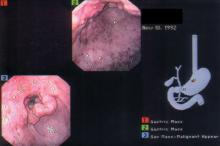The biopsy revealed that the patient had an adenocarcinoma.
The median age at diagnosis is 70 years and median age at death from gastric cancer is 73 years. High rates of stomach cancer occur in Japan, China, Chile, and Ireland. Eighty-five percent of stomach cancers are adenocarcinomas; 15% are lymphomas and GI stromal tumors.
Most tumors are thought to arise from ingestion of nitrates that are converted by bacteria to carcinogens. Sources include foods that are dried, smoked, and salted. Helicobacter pylori infection may contribute to carcinogenicity by creating gastritis, loss of acidity, and bacterial growth. Two important prognostic factors are depth of invasion through the gastric wall (less than T2 [tumor invades muscularis propria]) and the presence or absence of regional lymph node involvement.
In this case, liver metastases were found and the patient decided to not undergo chemotherapy. He died at home after 6 months of hospice care.
Figure courtesy of Michael Harper, MD. Text for Photo Rounds Friday courtesy of Richard P. Usatine, MD. This case was adapted from: Smith, M. Gastric cancer. In: Usatine R, Smith M, Mayeaux EJ, et al, eds. Color Atlas of Family Medicine. 2nd ed. New York, NY: McGraw-Hill; 2013:371-376.
To learn more about the Color Atlas of Family Medicine, see: http://www.amazon.com/Color-Family-Medicine-Richard-Usatine/dp/0071769641/
You can now get the second edition of the Color Atlas of Family Medicine as an app by clicking this link: http://usatinemedia.com/


